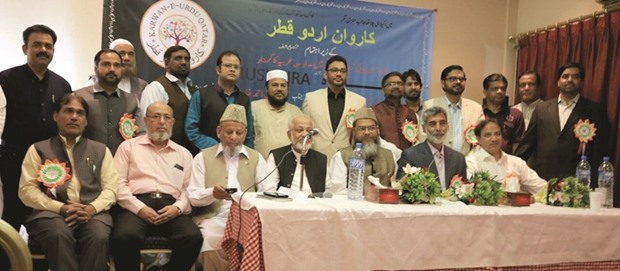Local Urdu poets got together recently – ahead of a grand mushaira (poetic symposium) planned for today (Friday) – to start off the “season of poetry” in Qatar. The poetic symposium today will feature poets such as Javed Akhtar from India and Amjad Islam Amjad from Pakistan and is the flagship event of the Majlis Farogh-e-Urdu Adab.
The preceding poetry symposium was organised by Karwan-e-Urdu Qatar (KUQ) and featured a large number of literature buffs from India and Pakistan.
The symposium featured members of different local literary community organisations such as Bazm-e-Urdu Qatar, Halqa-e-Adab Islami, Anjuman Muhiban-e-Urdu Hind, Guzargah-e-Khayal and Majlis Farogh-e-Urdu Adab.
KUQ is a newly established community organisation of Indian expatriates for the promotion of Urdu language. KUQ General Secretary Shahid Khan initiated the proceedings of the session with his introductory words. He also welcomed the guests and gave a brief introduction of the special guests of honour of the evening.
Renowned journalist and social activist Shadab Ahmed Khan presided over the symposium while Moulana Shamim Ahmed Nadvi, a renowned religious scholar coming especially from Nepal, was the chief guest. Mohamed Abdul Qadir (Asif) from Doha was the guest of honour.
In the first half of the event, Nadvi from Nepal gave a brief lecture on “the role of Madaris Arabia (Arabic religious institutions) in the development of Urdu.” In the quick talk, he explained all aspects of such institutions’ work and how they have contributed to the development of Urdu and its literature.
Madaris in South Asia have helped a great deal in spreading and publicising the Urdu language, besides bringing all Muslims together on the basis of language, said Nadvi.
He said journalism has also played a big role in development of the Urdu language. And here too, religious institutes have played a role by publishing monthly or weekly magazines. In Nepal for instance, he said, there are more than six journals that are published by Muslim religious institutes.
The event formally began with the recitation of the Holy Qur’an by Abdur Rahim. The poetic session started after the speech by the chief guest and it was conducted by KUQ President Atiq Anzar.
“The historic role madaris have played in the promotion and development of Urdu in the Indian sub-continent cannot be denied. The local education system pre-partition and in the years following it was largely dependent on such madaris,” said Anzar.
The aim of KUQ, he added, is only to promote the local talent and provide literary people with a platform to present and share their work with others. “It is a purely literary organisation and we have no political, financial or religious agendas or affiliations,” he added.
Khan said he is “unfortunately” not too well-versed in Urdu. “But from today’s symposium I have taken my inspiration to seriously pursue the study of Urdu. I will now make a serious effort to learn better Urdu and will try to participate in such literary gatherings in future as well,” said Khan.
He thanked the organisers and KUQ members for inviting him and pledged his support in future as well.
The poetry session went late into the night. Fartash Syed, Ateeq Anzar, Shad Akolvi, Aziz Nabeel, Iftikhar Raghib, Ahmed Ishfaq, Mansoor Aazmi, Qaiser Masood, Wazir Ahmed Wazir, Rashid Alam Rashid and many other poets presented their work.
The chief guest appreciated the work that was presented at the symposium. “Frankly speaking, the standard of poetry was much better than what I was expecting before coming here. I can now say that the future of Urdu poetry and literature is bright,” said Nadvi.
KUQ is also planning to hold a grand session on Qatar National Day in December, where they would invite poets from India and Pakistan. In their seminars they invite local and international literary experts.

Many literary and religious personalities attended the KUQ poetic symposium.
